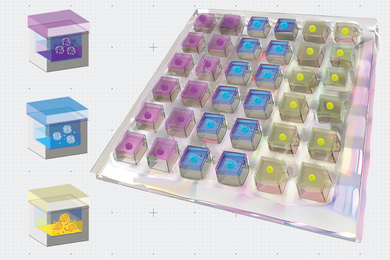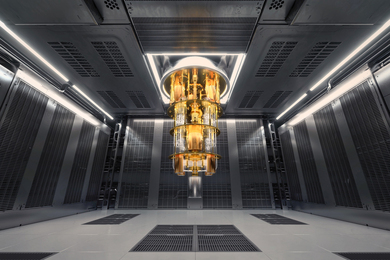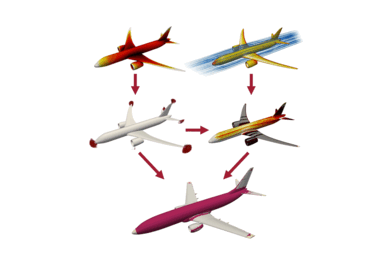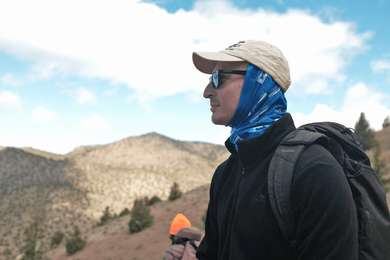MIT professor of mathematics Tom Leighton has been selected to receive the 2018 Marconi Prize. The Marconi Society, dedicated to furthering scientific achievements in communications and the Internet, is honoring Leighton for his fundamental contributions to technology and the establishment of the content delivery network (CDN) industry.
Leighton ’81, a professor in the Department of Mathematics and a member of the Computer Science and Artificial Intelligence Laboratory (CSAIL), will be awarded at The Marconi Society’s annual awards dinner in Bologna, Italy, on Oct. 2.
“Being recognized by the Marconi Society is an incredible honor,” said Leighton. “It’s an honor not just for me, but also for Danny Lewin, who created this company with me, and for all of the people at Akamai who have worked so hard for over two decades to make this technology real so that the internet can scale to be a secure and affordable platform where entertainment, business, and life are enabled to reach unimagined potential.
Leighton developed the algorithms now used to deliver trillions of content requests over the internet every day. Akamai, the world’s largest cloud delivery platform, routes and replicates content over a gigantic network of distributed servers, using algorithms to find and utilize servers closest to the end user, thereby avoiding congestion within the internet.
“Tom’s work at MIT and with Akamai has had a groundbreaking impact in making the world a more connected place," says Professor Daniela Rus, director of CSAIL. "His insights on web content delivery have played a key role in enabling us to share information and media online, and all of us at CSAIL are so very proud of him for this honor."
“What is amazing about Tom is that, throughout his career, he is and has been as comfortable and talented as a researcher designing clever and efficient algorithms, as an educator teaching and mentoring our undergraduate and graduate students, as an entrepreneur turning mathematical and algorithmic ideas into a rapidly-expanding startup, and as an executive and industry leader able to weather the storm in the most difficult times and bring Akamai to a highly successful company,” says Michel Goemans, interim head of the mathematics department.
Leighton has said that Akamai’s role within the internet revolution was to end the “World Wide Wait.” World Wide Web founder and 2002 Marconi Fellow Tim Berners-Lee, who was the 3Com Founders chair at MIT’s Laboratory for Computer Science (LCS), foresaw an internet congestion issue and in 1995 challenged his MIT colleagues to invent a better way to deliver content. Leighton set out with one of his brightest students, Danny Lewin, to solve this challenge using distributed computing algorithms.
After two years of research, Leighton and Lewin discovered a solution — but then faced the challenge of convincing others that it would work. In 1997, they entered the $50K Entrepreneurship Competition run by the MIT Sloan School of Management.
“We literally went to the library and got the equivalent of 'Business Plans for Dummies' because, as theoretical mathematicians, we had no experience in business,” Leighton remembers. But they learned quickly from those who did, including business professionals they met through the $50K Competition.
At the time, Leighton and Lewin didn’t envision building their own company around the technology. Instead, they planned to license it to service providers. However, they found that carriers needed to be convinced that the technology would work at scale before they were interested. “Akamai was state-of-the-art in theory, meaning that it was well beyond where people were in practice. I think folks were very skeptical that it would work,” says Leighton.
While carriers were ambivalent, content providers were receptive: The internet had proven vulnerable to congestion that was crashing websites during high demand periods. So Leighton and Lewin decided to build their own content delivery network and provide content delivery as a service. Although their business plan did not win the $50K contest, it attracted enough venture capital investment to get a company started, and Leighton and Lewin incorporated Akamai in 1998.
Akamai’s first big opportunity came in 1999 with the U.S. collegiate basketball tournament known as “March Madness.” With 64 teams playing basketball during the course of a few days, millions of viewers were watching their favorite teams online, mostly from work. When ESPN and their hosting company Infoseek became overloaded with traffic, they asked if Akamai could handle 2,000 content requests per second.
Leighton and his team said yes — even though up to that point they had only been delivering one request every few minutes. “We were a startup and we believed,” said Leighton. Akamai was able to handle 3,000 requests per second, helping ESPN to get back on line and run six times faster than they would on a normal traffic day.
Akamai’s technology and viability were proven; the company went public in 1999, earning millions for several of its young employees. But when the tech bubble burst the next year, Akamai’s stock plummeted and the firm faced the prospect of retrenchment. Then, on September 11, 2001, Danny Lewin was killed aboard American Airlines Flight 11 in the terrorist attack on the Twin Towers. Akamai employees had to set aside their personal grief and complete emergency integrations to restore client sites that had crashed in the overwhelming online traffic created that day.
Akamai rebounded from that dark period, and over the years evolved from static image content to handle dynamic content and real-time applications like streaming video. Today, Akamai has over 240,000 servers in over 130 countries and within more than 1,700 networks around the world, handling about 20 to 30 percent of the traffic on the internet. Akamai accelerates trillions of internet requests each day, protects web and mobile assets from targeted application and DDoS attacks, and enables internet users to have a seamless and secure experience across different device types and network conditions. They created new technology for leveraging machine learning to analyze real-user behavior to continuously optimize a website’s performance, as well as algorithms that differentiate between human users and bots. Akamai’s security business surpassed half a billion dollars per year in revenue, making it the fastest growing part of Akamai’s business.
“Dr. Leighton is the embodiment of what the Marconi Prize honors,” says Vint Cerf, Marconi Society chair and chief internet evangelist at Google. “He and his research partner, Danny Lewin, tackled one of the major problems limiting the power of the internet, and when they developed the solution, they founded Akamai — now one of the premier technology companies in the world — to bring it to market. This story is truly remarkable.”
By receiving the Marconi Prize, Leighton joins a distinguished list of scientists whose work underlies all of modern communication technology, from the microprocessor to the internet, and from optical fiber to the latest wireless breakthroughs. Other Marconi Fellows include 2007 winner Ron Rivest, an Institute Professor, a member of CSAIL and the lab's Theory of Computation Group, and a founder of its Cryptography and Information Security Group; and LIDS adjunct Dave Forney, ScD (EE) ’65, who received it in 1997.
In 2016, the MIT Graduate School Council awarded Leighton, jointly with Dean of Science Michael Sipser, the Irwin Sizer Award, for most significant improvements to MIT education, specifically for their development of the successful 18C major: Mathematics with Computer Science. Leighton was also inducted into the National Inventors Hall of Fame in 2017 for Content Delivery Network methods; Danny Lewin was also inducted posthumously.
Leighton said he plans to donate the $100,000 Marconi Prize to The Akamai Foundation, with the goal of promoting the pursuit of excellence in mathematics in grades K-12 to encourage the next generation of technology innovators.








